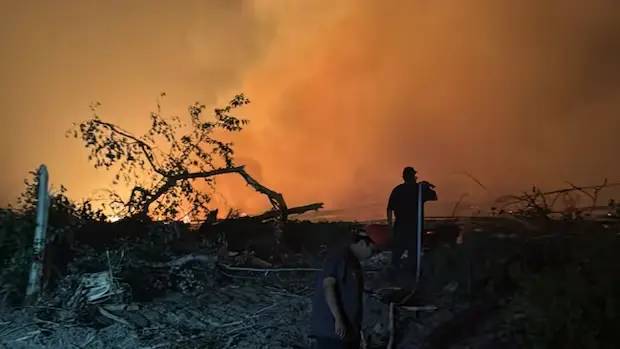Latest Ads
-
Jasmine Jewel
Call
-
Omidan group
Call
-
Amir Madanpour
Call
-
Dimo studio
Call
-
Yorkacademy
Call
-
Maryambagheri
Call
-
Shishlix Restaurant
Call

Manitoba needs more fire rangers to keep communities safe from future risks, chief says
Alex McDougall, Grand Chief of the Anisininew Okimawin Coalition, which includes indigenous communities in the Island Lake region of northeastern Manitoba, said the situation could have been different if more firefighters had been on the scene.
“If we had more firepower, this fire wouldn’t have come close to our communities and thousands of our people wouldn’t have been displaced to seek refuge in big cities, where they sometimes don’t feel welcome,” he said.
This year’s fire season has been the worst in Manitoba in three decades, with nearly 13,000 people displaced from their homes in northern and remote indigenous communities.
This is the second wave of fires since late May, and the Manitoba government has again declared a state of emergency. The approach to fighting the fires is set to be reviewed in light of climate change and the potential for more intense wildfires in the coming years.
McDougall hopes the review will result in larger firefighting teams so firefighters can respond more quickly.
“The current policy is to wait and see what happens, and that’s what it’s done: a lot of people are displaced. If they had sent in the first place, when they saw the smoke, they could have brought the fire under control,” he added.
There are currently 58 permanent firefighters and more than 300 seasonal workers, according to a Manitoba government spokesperson. But the Manitoba Government and Public Employees Union (MGEU) says the number of active firefighters this year is about 238, about the same as in 2009.
Kyle Ross, president of the union, said the job’s dangerous nature makes it difficult to recruit:
“Not everyone is willing to jump out of a helicopter and spend two days fighting a fire. It takes a special kind of person.”
While Manitoba is getting help from other provinces to fight the fires, Ross warned that how can Manitoba be expected to attract new recruits when firefighters can earn more doing the same work in other provinces?
According to federal government data, wildland firefighters in Manitoba earn one of the lowest wages in Canada — $13 an hour less than their counterparts in British Columbia, where more of them are employed.
Source
Suggested Content
Latest Blog
Login first to rate.
Express your opinion
Login first to submit a comment.
No comments yet.


































